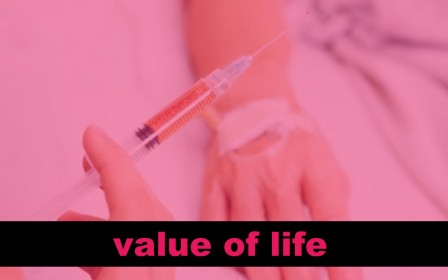
by Glyn Carpenter | 26 Jan , 2016 | FOCUS, NZCN, Submissions, Value of Life
Subject: Health Select Committee Inquiry Submission
Email: health@parliament.govt.nz
Date: Tuesday 26 January 2016
On the inquiry into “public attitudes towards the introduction of legislation which would permit medically-assisted dying in the event of a terminal illness or an irreversible condition which makes life unbearable.”
From: Glyn Carpenter
National Director
New Zealand Christian Network
297a Church Street, Auckland
Ph: (09) 525 0949 and (022) 184 7466
Submission summary
I am writing on behalf of New Zealand Christian Network to ask that the committee recommend that euthanasia not be legalised in New Zealand.
I do wish to speak to the committee in person.
Submission
- Introduction
- New Zealand Christian Network is a broad-spectrum network of churches and Christian leaders, with a Board of Reference that includes leaders from all the main denominations. We present positions on issues that reflect the views of the majority of Christians in Aotearoa New Zealand.
- Christians currently represent the largest faith group in Aotearoa New Zealand according to the national census with roughly half of the population indicating that they are Christian.
- Christians and Christian faith have played, and continue to play, an important role in this country.
- In 2014 we marked the bicentenary of the arrival of the Christian gospel in Aotearoa New Zealand which was an essential foundation for the Treaty of Waitangi and the bicultural partnership in our nation.
- Christian social services are a vital component of the social fabric in this country.
- Christian churches nurture spiritual faith and character based on the life and example of Jesus Christ who taught people to ‘love their neighbour’ and live in service of God and others. (According to Massey University research over 20% of the population attends church on a regular basis).
- This submission is based on a desire to achieve an outcome which is good for everyone in New Zealand.
- We have good connections with members of the Care Alliance and Euthanasia-Free NZ. Both of these groups are making submissions and we do not intend here to repeat here in detail the points they will be making. But we do want to register our general support for their submissions.
- We also have connections into the medical profession. We are aware of their general opposition to the proposal and we support their position.
- For and Against
- The main arguments for and against permitting ‘medically-assisted dying’ are presented in some detail on the Care Alliance, Euthanasia-Free NZ, and Voluntary Euthanasia Society websites, and in their public statements.
- Summary of the arguments Against (from the Care Alliance website):
- Legal safeguards cannot protect the vulnerable from euthanasia abuses
- Euthanasia and assisted-suicide are the ultimate tools for elder abuse
- It sends a hypocritical message about suicide
- The killing always increases
- Diagnosis and prognosis can be mistaken
- An easy death is not guaranteed
- It compromises the hospice movement
- Trust in doctors and nurses falls
- Arguments For (from the Voluntary Euthanasia Society website)
- The VES website has a document which contains responses to each of the arguments listed above.
- In addition, while there is no comparable document presenting a separate list of arguments in favour of assisted suicide, it seems that the main argument is individual autonomy or freedom of choice.
- Christians and Life
- The general Christian view is that life is a gift from God. Life is sacred. It is God’s to give and take.
- This belief over the centuries has contributed to the high regard that people generally have for life today
- This ‘life ethic’ influences areas ranging from our health system and hospice movement, through to human rights and social justice. Everyone benefits from these developments whether they are Christians or not.
- Because life is a gift from God, it is therefore not for individuals to end it (in the case of suicide), or for others to end it (in the case of assisted suicide).
- Christians and Autonomy
- Christians also have high regard for an individual’s right to choose, which is the main argument from proponents of a law change. But this right or freedom does not exist in isolation, nor is it absolute.
- Societies have to balance the rights of the individual and the rights of the community. We recognise that the state should only limit individual rights where they interfere with the health or safety of the community. There are limitations with this view though:
- It is often difficult to measure “health or safety” (the widely recognised problem with John Stuart Mill’s utilitarian philosophy)
- The concept of ‘unbearable’ is also problematic (as in ‘terminal illness or irreversible condition that makes life unbearable’). . How is ‘unbearable’ determined? If it boils down to the view of the individual, the proposition will end up being reduced to “if an individual wants assisted suicide they can have it”. . With many options available to make situations ‘bearable’, isn’t society better off if we focus on those, rather than pushing for an individual right which will profoundly change the way society views life?
- Clearly, something other than rights and law is needed to make a good and caring society
- Caricatures of the Christian position . The Committee should be alert to caricatures of the Christian position (e.g. the document “Christians and Religious Perspectives” on the Voluntary Euthanasia Society website http://www.ves.org.nz/christian-and-religious-perspectives). . A few examples should suffice (emphasis throughout added by this author):
- The document referred to begins with the phrase “Some Christians and Muslims argue that God gives us our life and hence we have no right to authorise anyone to hasten our death”. Misleading (this is mainstream teaching in both religions)
- “In general, Christians believe that God has given us free will … but when we wish to hasten our dying to limit our suffering, some tell us we are not allowed to do that”. . Obfuscation (hastening dying is not the only way to limit suffering) and misleading (not hastening dying is mainstream teaching)
- “God would prefer you to suffer rather than get help to end your life. God would prefer you to lose all your dignity rather than being able to say farewell to your loved ones while still conscious”. . False alternative (end life or suffer) and gross misrepresentation of God (God does not prefer people lose their dignity, and God does not present the false alternative)
- “… it is difficult to find a place where God or biblical writers say that futile suffering and pain is to be desired as one approaches death …” . Straw man argument – this is not biblical, neither is it mainstream teaching. . . The general theme is that God is harsh, and doesn’t mind, or perhaps even wants people to suffer. This is not true, and with access to palliative care, is simply irrelevant.
- Balancing the Gifts of Life and Freedom, of the Individual and Society
- This is the issue that is at the heart of this debate. Christian belief is not only that life is a gift from God, but that this belief has directly contributed to the society we all benefit from whether or not we hold to Christian belief.
- This belief obviously inclines us to see the merits in the detailed arguments listed above against permitting assisted suicide over and above the arguments for.
- But we should also not minimise the significance of the fundamental shift in society when we move from total ‘ethic of life’ (creating, preserving, healing, caring), to one where ‘death’ (intentionally ending life) is part of the culture.
- As the Church is significantly involved in community and social services, we are particularly concerned about the arguments involving the vulnerable and the elderly. . Elder abuse is already a significant issue in New Zealand, and it can be very hard to detect. It is easy to imagine a range of scenarios where elderly people will conceal abuse or emotional pressure, or perhaps not even be aware of it themselves. If assisted suicide is legalised, it is hard to believe that any regime will be able to fully safeguard against some people being pressured to end their own lives.
- Conclusion. We recognise that many people in New Zealand, in Parliament, and probably in the Select Committee, do not consider themselves to be Christians, and that the content of this submission, particularly the points directly connected to Christian faith or teaching, may be difficult to process. . We respectfully request that the Select Committee not reject these without considering the extent and role of Christian faith in New Zealand, and the fact that if the points in this submission are correct, Parliament’s role should be to preserve the ‘life ethic’ which is foundational in our society.
We recognise that many people in New Zealand, in Parliament, and probably in the Select Committee, do not consider themselves to be Christians, and that the content of this submission, particularly the points directly connected to Christian faith or teaching, may be difficult to process.
We respectfully request that the Select Committee not reject these without considering the extent and role of Christian faith in New Zealand, and the fact that if the points in this submission are correct, Parliament’s role should be to preserve the ‘life ethic’ which is foundational in our society.

by Glyn Carpenter | 24 Nov , 2015 | FOCUS, Media Releases, NZCN, Value of Life
Media Release
24 November 2015
NZ Christian Network is urging churches and individuals concerned about the possibility of euthanasia being legalised in New Zealand, to make submissions to the Health Select Committee before the due date 1 Feb 2016.
“There has been some very good work done by various groups on the issue. We are particularly impressed by and grateful for the work of the Care Alliance, which has produced a brochure to help people make submissions” – [Glyn Carpenter, NZ Christian Network]
The Care Allliance website contains all the information necessary to make a submission. This can be done online, or by email, or by traditional post.
“We are asking pastors and concerned individuals in churches to make sure the link to Care Alliance is circulated within churches” said Carpenter.
“But more than that … we have been informed by the chair of the select committee that if people are concerned about this issue, they MUST make a submission. Silence could be interpreted by MPs as people not caring.
Submissions can be as short as one sentence, or include as many points as people want to make. We’ve heard of one local church that finished its Sunday service early, handed out pens, paper, and envelopes, and in ten minutes, 130 submissions were written.
The important thing is for people to use their own words, and not to cut & paste someone else’s words.
We are also thankful to the Nathaniel Centre which produced the list of arguments below. People can use the list as a basis for making their own points in a submission.
[ENDS]
New Zealand Christian Network is a broad-spectrum network of churches and Christian leaders, with a Board of Reference that includes leaders from all the main denominations. It seeks to present a biblically orthodox position on issues, reflecting the views of the majority of Christians in New Zealand.
by Glyn Carpenter | 5 Aug , 2015 | FOCUS, GENERAL, Secularism, Social, Value of Life
Are the arguments presented in the current euthanasia debate honest?
This is the question put to me by a person who holds a Master’s Degree in philosophy and who is about to graduate as a medical doctor.
I asked him to write up what he was thinking, and this is what he wrote …
This is in response to the arguments for and against euthanasia typified by the Voluntary Euthanasia Society (VES) and Euthanasia-Free NZ (EFNZ) respectively.
There are two distinct, key issues currently being debated in NZ generally and by VES and EFNZ specifically:
- Is active euthanasia (or PAS) ever acceptable?
- Is it possible to implement a policy of PAS in some way shape or form that will adequately account for unwanted but predictable secondary consequences?
There are other important issues that are not really in question, that I think should be separated from the current debate. For example:
- Is passive euthanasia ever acceptable, and if so in what circumstances?
- Are interventions that may hasten death, even predictably hasten death, but are not directly designed to cause death, ever acceptable, and if so in what circumstances?”
Going back to those two key issues, I think they are quite different, in terms of category, and this should be acknowledged.
- The first is really a worldview issue. In a sense, one’s position is a fundamental premise that to some extent defies logical examination. One can never “prove” that one’s answer to this issue is right.
- The second is a matter of practicality. One can “prove” their case to be better than an alternative.
I believe that in the current debate, both the VES and EFNZ are guilty of eliding the two issues in a manner that is not entirely honest.
- Each major player has decided from a worldview perspective what the correct answer to the first issue should be.
- VES is closely aligned with the rationalist humanist point of view, one that promotes a very libertarian mind set.
- EFNZ is Christian, and believes life is inherently sacred and should not be “taken”.
- There is some hesitance to state these worldviews clearly, perhaps because it is so difficult to engage people in debate on that level or maybe it is seen as a turn off.
E.g. EFNZ says “We have no affiliation with any church, religion or any other secular organisation.”
Because of the failure to make this distinction, the debate slips and slides between the two major issues.
In any case, I think it is obvious that answering the objections raised by each side would do nothing to budge those whose fundamental convictions have already been made.
- It’s the classic story that for those who have faith, no evidence is necessary, and for those who don’t, no evidence is enough.
- This is why the debate goes back and forth on issues such as legal safeguards, and undermining trust in the medical profession
(see Arguments and Rebuttals on the VES site)
Furthermore, to have the conversation honestly around the second issue, would need a worldview that would allow PAS, which EFNZ cannot do.
- EFNZ may suggest that practical objections point to a higher truth, but again, that is an assertion that cannot be “proved”.
- A danger for the EFNZ is that if all their practical objections could be accounted for, then one would have to conclude PAS would be acceptable in some circumstances. And most of their objections are those of practicality (8/8 on the pamphlet).
Because of the above points, the arguments from both sides then, are directed at those who do not have a fundamental conviction, and are open to persuasion.
- So it does not matter so much if the arguments are valid, so long as they are persuasive.
- This is why the arguments for and against PAS can be so weak and illogical, because this is not their primary requirement for each side.
- This is akin to telling a children “noble lies” (described by wikipedia as a “myth or untruth, often, but not invariably, of a religious nature, knowingly told by an elite to maintain social harmony or to advance an agenda. The noble lie is a concept originated by Plato as described in the Republic).
Three other points:
- I think the approach of groups like Euthanasia-Free NZ is doomed to failure
- Perhaps EFNZ thinks that as long as people are persuaded by something to vote against any bill or referendum, then it doesn’t matter how valid the arguments are, as they are achieving a good outcome BUT
- If their practical objections can be demonstrated to be wrong, this undermines their position
- Debate over practical objections has a tendency to get messy and confusing, this undermines their position
- They are on the losing side of a general social thrust towards personal rights (prostitution reform bill, marriage equality bill), and their opposition to this makes them seem callous, and this undermines their position
- I don’t think it is so much the Christian’s job to stop what society wants, but rather to change what society wants
- We need to address the fundamental world view stuff, the rest will follow
- I think the most persuasive augments here are examples.
- For me, moving towards a position against PAS was due to a combination of seeing palliative services in action, and Victor Frankel’s book, “Man’s search for meaning”.
- People need to see that suffering is not something to fear and necessarily to avoid.
- If PAS does become legal, then doctors should be excluded from it.
- I agree entirely with the NZMC Code of ethics statement: “Doctors should bear in mind always the obligation of preserving life wherever possible and justifiable, while allowing death to occur with dignity and comfort when it appears to be inevitable. In such inevitable terminal situations, treatment applied with the primary aim of relieving patient distress is ethically acceptable, even when it may have the secondary effect of shortening life.”
The writer wished to remain anonymous. But we think he has raised some interesting points and questions.
What do you think? Would it be more honest, perhaps also more effective, to state that we believe there is a God, that life is a gift from God, and that God alone has the right to end life. Further, we believe that everyone will one day come face-to-face with God and have to account for their actions in this life.
Please let us know your thoughts.

by Glyn Carpenter | 4 Oct , 2013 | FOCUS, Value of Life
Driving home today listening to a National Radio Worldwatch item about discussions in Belgium about euthanasia for children. Who said we don’t need to worry about a slippery slope?
We can be thankful for the time being that Maryan Street’s euthanasia bill for New Zealand has been withdrawn, but we should also remember that it is “only for the time being”. When advocates think the time is right, the bill will be reintroduced and Kiwis need to be ready and informed.
Having dinner recently with a friend in Wellington who I regard as very clued up in matters of church and public issues, I was surprised to hear him talk about switching off life-support machines as euthanasia. It’s not!
And if people are not well-informed on the issue, there’s a real danger that when a bill to legalise euthanasia is re-introduced, misinformation will determine the outcome rather than facts and the public good.
One group that I have met has set up a website called euthanasiadebate.org.nz which gives some pretty simple facts and arguments against legalising euthanasia. In a one page flyer called “8 dangers of legal euthanasia” they talk about difficulties with so-called legal safeguards, elder abuse, and other reasons why legalising euthanasia is not a good idea. The back page of the flyer provides answers to common FAQs.
A student doctor I know changed his view on this issue after reading the information and meeting with Professor David Richmond, chair of HOPE Foundation, who supports this initiative and is a specialist in this field.
I recommend having a look at the flyer, and if you think it’s useful forward this post to others. If it’s easier, you can even use the Facebook / Twitter buttons below to share it with your friends.
http://euthanasiadebate.org.nz/wp-content/uploads/2013/05/Eight-Reasons-Flyer-1.5.13b.pdf

by Dr Stuart Lange | 4 Nov , 2023 | Articles, Christianity and Social & Moral Issues
This week’s confirmation of the final election results brings closer the dissolution of the caretaker Labour government, and the forming of a new National-led coalition government. Like any government, the Labour Government leaves office with its own share of good and not-so-good policies, its achievements and under-achievements, and its failures.
What does New Zealand need from any new government? We suggest we might hope and pray for a government that is…
- respectful of God, and of all people whatever their beliefs
- determined to govern with truthfulness, integrity, justice, humility, and a collaborative spirit
- working for good law and order, but not in a way that simply punishes without rehabilitating and which tends to entrench criminality
- carefully managing the economy, for the benefit of all
- willing to use taxes to better fund essential public services, including our struggling health system
- committed to the wellbeing of all New Zealanders, to reducing poverty and social deprivation, and to making New Zealand a more just and equitable society for everyone
- eager to make housing affordable and healthy for everyone
- carefully seeking to foster an atmosphere of intercultural goodwill, reconciliation and partnership, rather than of fear and division
- willing to implement measures to significantly reduce New Zealand’s carbon emissions and to reverse other environmental degradation
- more mindful of the sanctity of human life (and willing to review legislation to provide better protections for the vulnerable in regard to both euthanasia and abortion)
- more honouring of traditional marriage, gender, and sexual ethics (and willing to pull back the more extreme aspects of some current legislation and of primary school sex education)
- determined to defend everyone’s liberties of thought, belief, expression, and practice









